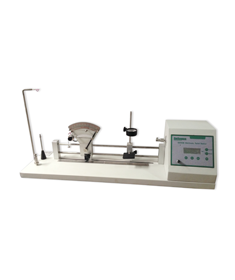What is the market situation of Twist Tester Electronic?
This testing machine utilizes the varying lengths of twisted yarns to detect these changes using a pointer or sensor, thereby determining the twist value of the tested material. Twist is a crucial reference for textile manufacturing. This electric twist measuring machine, equipped with the latest F1C controller, features built-in pre-tension data for user access and automatically determines test piece length. Real-time data is displayed on the screen during testing, allowing users to better understand the test status. Post-test statistical analysis is also possible, providing users with comprehensive test information.
Market Trends
The global electronic yarn twist tester market presents significant growth opportunities due to the growing demand for high-quality textiles and the adoption of advanced testing technologies. Key market drivers include the need for precise twist measurement in yarn production, the increasing emphasis on quality control, and the stringent industry standards of textile manufacturing. Recent market trends indicate a shift towards automation and digitalization. Manufacturers are deploying IoT-enabled devices and software to improve accuracy, efficiency, and data analysis. Furthermore, there is a growing adoption of non-contact testing methods, which offer advantages such as increased speed, reduced sample damage, and improved repeatability. Opportunities in the electronic yarn twist tester market lie in the expansion of the textile industry in emerging economies, particularly in Asia Pacific and Latin America. Furthermore, growing demand for technical textiles in industries such as automotive, aerospace, and healthcare presents untapped market growth potential. By leveraging advances in sensor technology and data analytics, manufacturers can create innovative and user-friendly solutions to meet the evolving needs of the market.
Market Drivers
Growing Demand for High-Quality Textiles
The global textile industry is experiencing a growing demand for high-quality fabrics, particularly in emerging economies. Consumers are becoming increasingly sophisticated and discerning, demanding textiles with superior properties such as strength, durability, and aesthetics. Electronic yarn twist testers play a vital role in ensuring textile quality by accurately measuring yarn twist levels, a key factor in determining a fabric's strength, feel, and appearance. With the rising demand for high-quality textiles, the market for electronic yarn twist testers is expected to expand significantly.
Advances in Textile Manufacturing Technology
Driven by the adoption of automation, robotics, and digitalization, the textile manufacturing industry is experiencing rapid technological advancements. These advancements are improving efficiency, productivity, and quality control in textile production. Electronic yarn twist testers are a crucial component of this technological transformation, as they can monitor and control yarn twist levels in real time, ensuring that the final product meets the required specifications. The integration of electronic yarn twist testers into advanced textile manufacturing systems is expected to drive market growth in the coming years.
Increasing Emphasis on Product Safety and Regulatory Compliance
The global textile industry is placing increasing emphasis on product safety and regulatory compliance. Consumers are increasingly aware of the potential health and environmental hazards associated with textiles, and regulators are implementing stricter standards to ensure product safety. Electronic yarn twist testers help manufacturers comply with these standards by providing accurate and reliable yarn twist measurements, which is critical to ensuring the safety and performance of textile products.
Market Insights by Machine Type
Machine Type Segmentation Insights and Overview: The global electronic yarn twist tester market is segmented by machine type into manual yarn twist testers, semi-automatic yarn twist testers, and automatic yarn twist testers. Manual Yarn Twist Testers: Manual yarn twist testers are the most basic type of electronic yarn twist tester and require manual operation to determine the twist of yarn. They are typically used for testing small batches and in environments where cost is a major consideration. The global electronic yarn twist tester market revenue for manual yarn twist testers is projected to reach USD 15.6 million by 2028. growing at a CAGR of 4.5% during the forecast period. Compared to manual yarn twist testers, semi-automatic yarn twist testers offer a higher level of automation, reducing the need for manual intervention during the testing process. They are equipped with features such as automatic yarn clamping and digital display of test results, making them suitable for medium-volume testing applications. The global electronic yarn twist tester market segment for semi-automatic yarn twist testers is projected to reach USD 22.3 million by 2028. growing at a CAGR of 5.2% during the forecast period. Automatic yarn twist testers: Automatic yarn twist testers are the most advanced type of electronic yarn twist tester and offer the highest level of automation. They are capable of performing multiple tests simultaneously, providing fast and accurate results. Automatic yarn twist testers are ideal for high-volume testing applications and environments where efficiency and productivity are critical. The global electronic yarn twist tester market data for automatic yarn twist testers is projected to reach USD 35.8 million by 2028. growing at a CAGR of 6.1% during the forecast period. The growth of the automatic yarn twist tester segment is attributed to the increasing automation in the textile industry, the need for efficient and accurate testing methods, and the growing demand for high-quality yarns. In addition, the growing focus on quality control and product consistency is driving the demand for automatic yarn twist testers as they provide reliable and repeatable test results.
Multi-Dimensional Market Landscape
The global electronic yarn twist tester market presents a multi-dimensional landscape. Segmented by yarn material, the market encompasses cotton, polyester, nylon, wool, and silk yarns. Cotton yarn, widely used in the textile industry, is expected to hold the largest market share by 2024. Its high strength, absorbency, and breathability make it suitable for the production of a variety of fabrics, including clothing, bedding, and towels. Polyester yarn, on the other hand, is increasingly used in sportswear, home furnishings, and industrial materials due to its durability, wrinkle resistance, and moisture-wicking properties. It is expected to grow at the highest compound annual growth rate during the forecast period. Growing demand for technical textiles in industries such as automotive, aerospace, and healthcare is further driving the polyester yarn sector.
By display type, the market is divided into analog and digital yarn twist testers. By 2024. the digital yarn twist tester market is expected to capture the largest share, valued at approximately US$120.52 billion. Their advanced features and measurement accuracy provide precise digital readouts, making them ideal for quality control and research applications. The analog yarn twist tester market is projected to grow at a compound annual growth rate of 4.02% during the forecast period, reaching a value of approximately US$59.3 billion by 2032. Due to their lower price point, they are commonly used in small-scale textile industries. The growing demand for high-quality textiles and the adoption of automated testing systems are driving the overall growth of the electronic yarn twist tester market.
By application, the market is categorized into the textile industry, yarn manufacturing industry, R&D centers, and educational institutions. The textile industry dominates the market, accounting for a significant share of global electronic yarn twist tester market revenue in 2023. driven by its widespread use in quality control and ensuring consistent yarn properties. The yarn manufacturing industry also holds a significant market share due to the need for precise twist measurement during production. R&D centers and educational institutions use electronic yarn twist testers for research and educational purposes, respectively, contributing to market growth.
In terms of standards, ASTM D1423 and ISO 2061 provide comprehensive guidelines for measuring yarn twist, ensuring accurate and consistent results across the industry. Growing demand for high-quality textiles is expected to drive significant revenue growth in the global electronic yarn twist tester market by 2024. Adoption of these standards by leading manufacturers will help standardize yarn twist testing methods, facilitate global trade, and improve product quality. Standard-based market segmentation also enables manufacturers to meet the specific requirements of different industries, providing valuable insights for market growth and enabling stakeholders to make informed decisions.
Regionally, the global electronic yarn twist tester market is segmented into North America, Europe, Asia Pacific, South America, and the Middle East & Africa. North America is expected to hold the largest market share by 2024 due to its large number of textile and apparel manufacturers. Europe is projected to be the second largest market. Asia Pacific will experience the highest growth rate during the forecast period, driven by increasing demand for electronic yarn twist testers in countries such as China, India, and Bangladesh. South America and the Middle East & Africa contribute relatively small shares to the global market but are expected to grow steadily during the forecast period.
In summary, the global electronic yarn twist tester market is experiencing a period of development brimming with opportunities and transformation. From the testing machines' ability to accurately determine twist values based on yarn characteristics, to the market's significant growth potential driven by factors such as the demand for high-quality textiles and advanced testing technologies, to the market drivers driven by the growing demand for high-quality textiles, advancements in textile manufacturing technology, and the increasing emphasis on product safety and compliance, to the development of manual, semi-automatic, and automatic yarn twist testers, the market demonstrates vibrant growth across multiple dimensions, including yarn materials, display types, application areas, standards, and regional markets. With the expansion of the textile industry in emerging economies, the growing demand for technical textiles in industries such as the automotive sector, and advancements in sensor technology and data analytics, the electronic yarn twist tester market is expected to continue to innovate and develop, providing higher-quality and more efficient testing solutions for the textile industry and related sectors, driving the entire industry towards a higher-quality development stage.


